
Home Rule League Meets in Dublin Becomes a Political Party
November 18, 1873
The Home Rule League (1873–1882) was a political organization in Ireland that advocated for self-governance or “Home Rule” for Ireland within the United Kingdom.
The movement sought to establish a devolved Irish parliament with the power to legislate on domestic matters, while certain key issues such as defense and foreign affairs would remain under the authority of the British Parliament.
The Home Rule League was replaced by the Irish Parliamentary Party. The Home Rule Confederation of Great Britain was a sister organisation in Great Britain.
The Home Rule League grew out of the Home Government Association, a pressure group formed in 1870 and led by Isaac Butt, a Dublin based barrister who had once been a leading Irish Tory before becoming a convert to Irish nationalism. On 18–21 November 1873, the loose association re-constituted itself as a full political party, the Home Rule League, and in the 1874 general election, many of whom were from an Irish aristocratic or gentry Church of Ireland background, some newly dedicated former Irish Liberal Party members, such as Sir John Gray MP, and other more radical members who gathered around Cavan MP Joseph Biggar and Meath MP Charles Stewart Parnell. This radical wing of the party launched parliamentary filibusters to obstruct the passage of Parliamentary business, to the embarrassment of Butt and frustration of successive British governments.
Formation: The Home Rule League was officially formed in 1873 by Isaac Butt, a prominent Irish nationalist and Member of Parliament. The League’s primary objective was to achieve Home Rule for Ireland through constitutional means.
Isaac Butt: Isaac Butt, a lawyer and politician, was a key figure in the Home Rule movement. He believed that securing a form of self-government for Ireland within the UK framework was a pragmatic and achievable goal.
Land Reform: In addition to advocating for Home Rule, the Home Rule League also supported land reform measures to address the agrarian issues affecting Irish tenant farmers.
Successor to the Home Government Association: The Home Rule League succeeded the earlier Home Government Association, which had a similar goal of constitutional reform but was not as organized or influential.
Charles Stewart Parnell: Charles Stewart Parnell, a charismatic and influential leader, later emerged within the Home Rule movement. Parnell’s leadership and advocacy for land reform and Home Rule brought increased support to the cause.
Electoral Success: The Home Rule League and its successor, the Irish Parliamentary Party (formed in 1882), achieved significant electoral success, winning a substantial number of seats in the British Parliament.
Home Rule Bills: The Home Rule movement influenced the introduction of several Home Rule Bills in the British Parliament, with varying degrees of success.
Despite its initial successes, the Home Rule movement faced challenges and opposition, particularly from unionists in Ireland who wished to maintain the union with Great Britain. The issue of Home Rule remained a contentious and central theme in Irish politics leading up to the establishment of the Irish Free State in 1922.